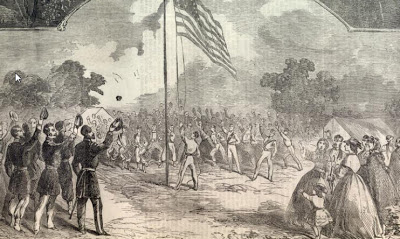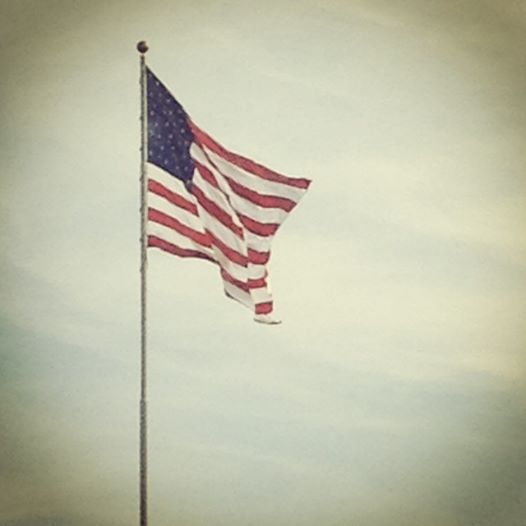War on the 4th
On the fourth day of July, Americans join together in a celebration of Independence. We show our pride by sporting red, white, and blue, launching fireworks, and firing up the grill. During the years 1861-1865, four Independence Days passed by with noise from cannons and rifles rather than fireworks, with the rebel yell echoing over battlefields rather than cheers in the streets. The people of the United States were held prisoner by a war that ravaged the land and took countless lives, a war against the worst sort of enemy: themselves. When our founding fathers signed the Declaration of Independence in 1776, they had no idea that this fledgling country would be split in twain less than 100 years later.

July 4, 1861:
As Abraham Lincoln struggled to cope with the largest crisis any US President has ever faced, Americans reeled from the realization they were at war. Lincoln summoned an emergency meeting in an attempt to deal with the rebellious southern states. He outlined the South’s actions and explained how he hoped to respond. Most importantly, Lincoln asked Congress to approve and gather an army of 400,000 volunteers to fight for the North. He claimed the nation could not survive divided and that the Civil War was a threat to free governments across the world:
“It presents to the whole family of man, the question, whether a constitutional republic, or a democracy—a government of the people, by the same people—can, or cannot, maintain its territorial integrity, against its own domestic foes. It presents the question, whether discontented individuals, too few in members to control administration, according to organic law, in any case, can always, . . . break up their Government, and thus practically put an end to free government upon the earth.” – Abraham Lincoln
Lincoln ended his message with the following statement: “Having thus chosen our course, without guile and with pure purpose, let us renew our trust in God and go forward without fear and with manly hearts.” Lincoln hoped the South would surrender when faced with quick offensive action by a formidable northern army. Unfortunately his hopes were unfulfilled as the Civil War ushered in a dark and troubled era.
July 4, 1862:
The North was struggling to lead the war as another disheartening Independence Day passed. Union Major General George B. McClellan was forced to retreat when he was defeated by General Robert E. Lee during the Seven Days Battles near Richmond, Virginia. The conflict continued on the water as a drawn out battle between the CSS Teaser and USS Maratanza finally came to a close. The CSS Teaser was captured, renamed, and used as a Union ship. Despite outnumbering the Confederacy, the first year of the Civil War had been hard on the Union. Lincoln’s hopes of reuniting the country slipped further and further away.
July 4, 1863:
Although General Robert E. Lee had just accomplished “his greatest victory,” of the war, the Army of Northern Virginia would soon fall to disarray. The third Independence Day of the Civil War was a day of celebration – at least for the Union. The tide finally seemed to be turning as George Meade won an important but bloody victory in the East. Nearly 6,000 men lay wounded on the battlefield at Gettysburg. In the West, General John Pemberton surrendered to Ulysses S. Grant after the siege of Vicksburg. Because Pemberton surrendered on the fourth, his men were allowed to return home on parole after returning their weapons. Most of these soldiers chose to stay home, even though many paroles expired before the end of the war. Vicksburg refused to recognize Independence Day for many decades.
By the end of the day, the Confederacy had also lost control of the Mississippi River. Between Gettysburg and Vicksburg, the Confederacy suffered nearly 30,000 casualties, a setback from which they would never recover. Despite Union casualties, this Independence Day marked a return of faith in the Union and created a valuable sense of hope.
July 4, 1864:
As the war drew to a close, “no turning back” became the new Union mantra. After two months of conflict in Virginia, Ulysses S. Grant had finally trapped Robert E. Lee’s forces at Petersburg. Sherman was moving through the South, taking control of strategic locations like Atlanta. Meanwhile, Washington started to focus on post-war reconstruction. How would the Union deal with the rebellious states? Lincoln was tight-lipped with his plans. Not even Congress knew what would happen after the war. Many northerners worried that Lincoln would be too easy on the South. After all, he had just caused a rift in his followers by pocket-vetoing the Wade-David Bill, a rule preventing any man who had fought against the Union from voting or holding office. And who would be in charge of rebuilding, Congress or Lincoln?
The Civil War drastically changed what it meant for Americans to be free and Independent. Although it is doubtful they envisioned a civil war, the following quote by John Adams shows that our founding fathers knew hard times would come when they sent the signed declaration to King George.
“ I am well aware of the toil and blood and treasure it will cost us to maintain this declaration, and support and defend these states. Yet through all the gloom I see the rays of ravishing light and glory. I can see that the end is worth all the means.” – John Adams
Sincerely wishing everyone a happy and safe Independence Day!

Thanks Caroline!
Great Job Caroline! This is a thoughtful and insightful article. You know those founding fathers really were something. Sure wish we could have a few of them come back and fix this country!
Love reading your articles!!